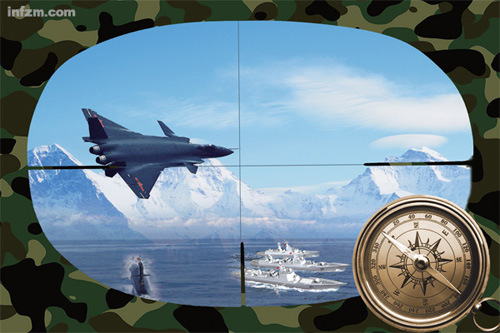
With today's battlefields becoming a more unpredictable theatre, an integrated joint military operations center is an essential requirement.
China is rapidly strengthening its military capability by founding several research centers in the last two months of 2011. Their establishment marks a transition period for the Chinese Army.
On November 22, the People's Liberation Army (PLA) established a strategic planning department and is rapidly modernizing itself for more sophisticated operations.
The department, administered by the General Staff Headquarters, will be responsible for studying of critical strategic issues, drafting plans and reform proposals, offering advice on the allocation of PLA strategic resources, and examining and evaluating the implementation of plans for the PLA's development, reported China Daily.
"The new department will become an authorative and comprehensive planning center," Luo Yuan, deputy secretary-general of the China Society of Military Science, told China Daily, adding that the move has been in response to the increasingly sophisticated military operations that will be required in the future, which may involve multiple combat forces and alternative headquarters.
Soon after, the Academy of Military Sciences (AMS) set up the Military Operations-Other-Than-War Research Center on December 12, officially integrating as many as 28 experts and scholars from other state organs such as the Central Military Commission headquarters, armies, institutions, armed police and public security system.
The center, said the People's Daily, is mainly in charge of implementing research tasks assigned by the Central Military Commission headquarters and the AMS; they study practical matters in non-traditional security threats and basic theories of military operations for non-war conditions, and carry out in-depth theoretical research on anti-terrorism, maintenance of civil stability, emergency rescue, disaster relief, rights and interests protection, security alerts, international peacekeeping, international rescue, and joint military drills in peacetime.
Moreover, the center will also establish relevant theoretical systems and organize related seminars, provide on-going guidance on matters related to theory, and participate in military drills.
On December 20, the AMS opened another two research centers—the National Defense Policy Research Center and the China-US Defense Relations Research Center.
The former is tasked to contribute to the formulation of China's defense white paper, prepare an annual strategic assessment on the country's security environment, examine major theoretical and practical issues concerning national defense, and hold academy-wide, military-wide, or international seminars on national defense theory. The latter's tasks mainly include examining major practical issues concerning China-U.S. defense relations, promoting bilateral academic exchanges and communication on national defense, and explaining the policy and stance of the Chinese government and armed forces on specific and timely issues, pointed out the People's Daily.
The PLA followed this act with the consolidation of a new Training Department on December 21, to operate under the General Staff Department (GSD) and oversee training of all the PLA services. This, commented China Brief Magazine, is an important development for the Army, since it reinforces a theme that has persisted for a decade: PLA reforms to improve the quality of military personnel, including pilots and noncommissioned officers.
Running parallel to the renaming and redirection of the PLA Communications Department to the Informatization Department earlier this year, the Training Department is expected to play a leading role in designing new lines of training in concepts that promote awareness of the PLA's evolving use of information and systems integration in military operations, revealed the PLA Daily.
With today's battlefields becoming a more unpredictable theatre, an integrated joint military operations center is an essential requirement. The Training Department can serve the whole army, including land, air and sea forces.
Some keen-eyed experts had already spotted signs of the development of think tanks in China's military forces.
Learning from foreign countries, especially the United States which runs a considerable number of world-class official and non-official think tanks, China is also placing great importance on developing and improving similar organizations of its own.
More talents with various professional backgrounds will join China's military think tanks, said the Southern Weekend, including those who have served in senior positions in the military.
Non-official think tanks will also be increased as "Track II" diplomacy gains a foothold; this is a specific kind of informal diplomacy in which non-officials (such as academic scholars, retired civil and military officials, public figures, and social activists) engage in dialogue for conflict resolution and confidence-building, and it is playing an important pre-official role worldwide.
It may take some time to assess the impact of these organizational reforms, but the PLA has left a trail of breadcrumbs about its concerns for the future of the force—a trail analysts should follow, noted The Jamestown Foundations.

Copyright ©1999-2011 Chinanews.com. All rights reserved.
Reproduction in whole or in part without permission is prohibited.